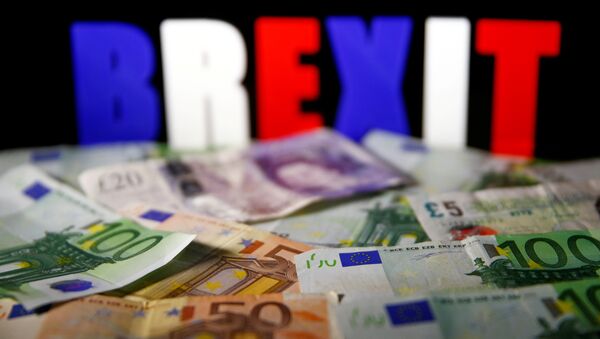Sputnik: How accurate do you think the leaked economic forecast titled "EU Exit Analysis — Cross Whitehall Briefing" is?
David Paton: It's a leak, so we have not seen the actual details, but it seems that this forecast has come from the Treasury. And the problem is that the Treasury has really lost credibility when it comes to making forecasts. They made similar forecasts before the [Brexit] referendum suggesting that immediately, the UK voted leaving the EU would be a big hit to GDP [gross domestic product] that an immediate recession, unemployment would go up by 500,000 or so. Since then we have actually seen a reverse, we've seen companies continuing to invest in the UK, we've seen unemployment going down to record lows. So the problem now is making sort of similar forecasts at this stage have people going to take them with a pinch of salt, saying if they got it so wrong before why should these forecasts be right.
READ MORE: UK Gov't Analysis on Brexit: Not Much of Surprise — Political Commentator
Sputnik: Critics say that the economic modeling was very speculative. Would you say that that might be the case as well?
David Paton: Yes, I mean all economic modeling is to a certain extent. It's quite brave to make forecasts about what will happen in fifteen years-time given the difficulties this economy has had in forecasting the next six months. Clearly any forecast like this is speculative. Of course you've got to make some effort to look at various different scenarios, I think the problem with these type of approaches that we've seen from the Treasury — without seeing the details it's difficult to be certain — is that they tend to make the assumptions that, for example, that leaving the EU on World Trade Organization's terms will inevitably mean a reduction in trade and that will feed through to GDP.
READ MORE: Report Calls for Post-Brexit Clampdown on Unskilled Immigration
Of course, that's not necessarily the case, it all depends on what the relationship is with the rest of the world. The EU is a customs union, so it exists to try to keep goods out or make goods coming from outside the EU more expensive. So outside the EU, the UK will have a range of possibilities that it can choose to do. So it could, for example, to make imports cheaper on things like clothing, and footwear and food which over the course would give a boost to the UK economy. So lots of these forecasts would depend on the sort of assumptions and scenarios you decide to model. And without seeing what the Treasury has done we can't be certain but what I've heard sounds like they have not really modeled the sort of upside of leaving the EU.
Sputnik: Does this report in any way coincide with any of the reporting that has been done by such companies as S&P, Moody's, and Fitch?
David Paton: Yes, it does coincide with some of the economic modeling that has been going on by organizations like S&P there is a range of estimates out there on this. So the Economists for Free Trade, for example, have estimated that leaving the EU based on WTO terms when we can decide to go for free trade could actually boost GDP over time by 5 percent or so. You have a range of outcomes and it sounds like this Treasury forecast is sort of erring on the pessimistic side. […]
The views and opinions expressed by David Paton are those of the analyst and do not necessarily reflect those of Sputnik.


